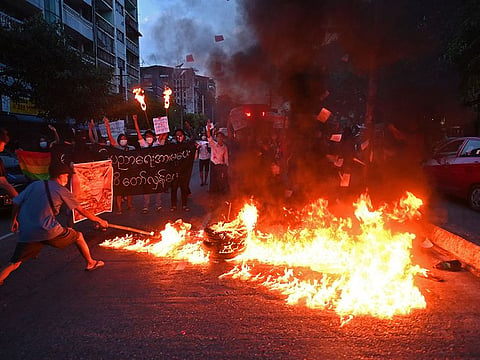Myanmar crisis: Regard for civilian lives is a must
How an air strike during concert in Kachin, Myanmar killed scores from ethnic minority

We didn’t watch it unfold, as events like it often do, in real time on our television screens, for it took place out of sight, out of mind in Myanmar.
Here’s what went down on Sunday — and went down in both senses of the word — in the village of A Nang Pa, in the ethnic state of Kachin, in the country’s northeast, a region that has long sought autonomy and its rebels had fought the central government for years: During an outdoor concert on that day, three military jets flew overhead and dropped bombs on the venue.
One bomb hit the main stage, killing the lead vocalist and several other performers, who had been in the middle of a song. At least 80 other people were killed in the attack, with the spotlight that illuminated the stage at the outdoor event making it easy for the pilots to aim directly at their targets.
The massacre triggered international condemnation and renewed calls for a global arms embargo and tougher banking sanctions against the junta, which had seized power in a coup in February last year that propelled millions of Burmese of different ethnicities (and Myanmar is a country of enormous ethnic minorities, reportedly as many as 135, living in seven minority states) to oppose it.
To date, that junta has not been held accountable for the killings and the arrests including that of Aung San Suu Kyi, the 76-year-old former head of state, who on Feb. 21 was convicted.
We call individuals like Stephen Paddock, the 64-year-old lone gunman who in October 2017 opened fire from the 32nd floor of the Mandalay Hotel in Las Vegas on an outdoor concert below, killing 60 people and wounding close to 500 others, a terrorist. And that’s what he was. But what do we call the actions in Myanmar?
Various shades of terrorism
Aristotle, wrote critically about the “terror employed against subjects”, and the word “terrorism”, as we understand it today, began its lexical career in the Oxford English dictionary in 1795, used in context of the series of massacres and executions that followed the creation of the First Republic in France two years earlier.
All of which, at the time, drove Edmund Burke, the Irish-British statesman, to denounce “those hell-hounds called terrorists” who were then “threatening the stability of Europe”.
The attack on the outdoor concert in Kachin was an outrage. It was not, however, the first — nor is it likely to be the last — of its kind.
Strikes against civilians
According to the National Unity Government, a shadow government made up of ethnic leaders from across the country, along with formerly elected officials who had escaped arrest after the coup, the junta has so far launched nearly 240 such attacks against civilians, the most recent being the one directed last month at a school, that killed 14, including seven children.
Human rights groups have called on world leaders, as well as on the Association of Southeast Asian Nations (ASEAN), a regional bloc of 10 states that coincidentally is meeting in early November, to do something, anything, but little action is expected to be taken.
“For over a year and a half, the junta has carried out grave abuses against people who oppose military rule”, the New York Times on Tuesday quoted Elaine Pearson, the Asia director of Human Rights Watch, as asking. “How high does the death count need to reach before governments around the world impose consequences that will impact the junta’s behaviour?”
This is a question still searching for an answer, and the sooner that is found, the sooner a stop will be put the horror that took place on Sunday — for many of us out of sight, out of mind,
Fawaz Turki is a journalist, academic and author based in Washington. He is the author of The Disinherited: Journal of a Palestinian Exile.
Sign up for the Daily Briefing
Get the latest news and updates straight to your inbox



